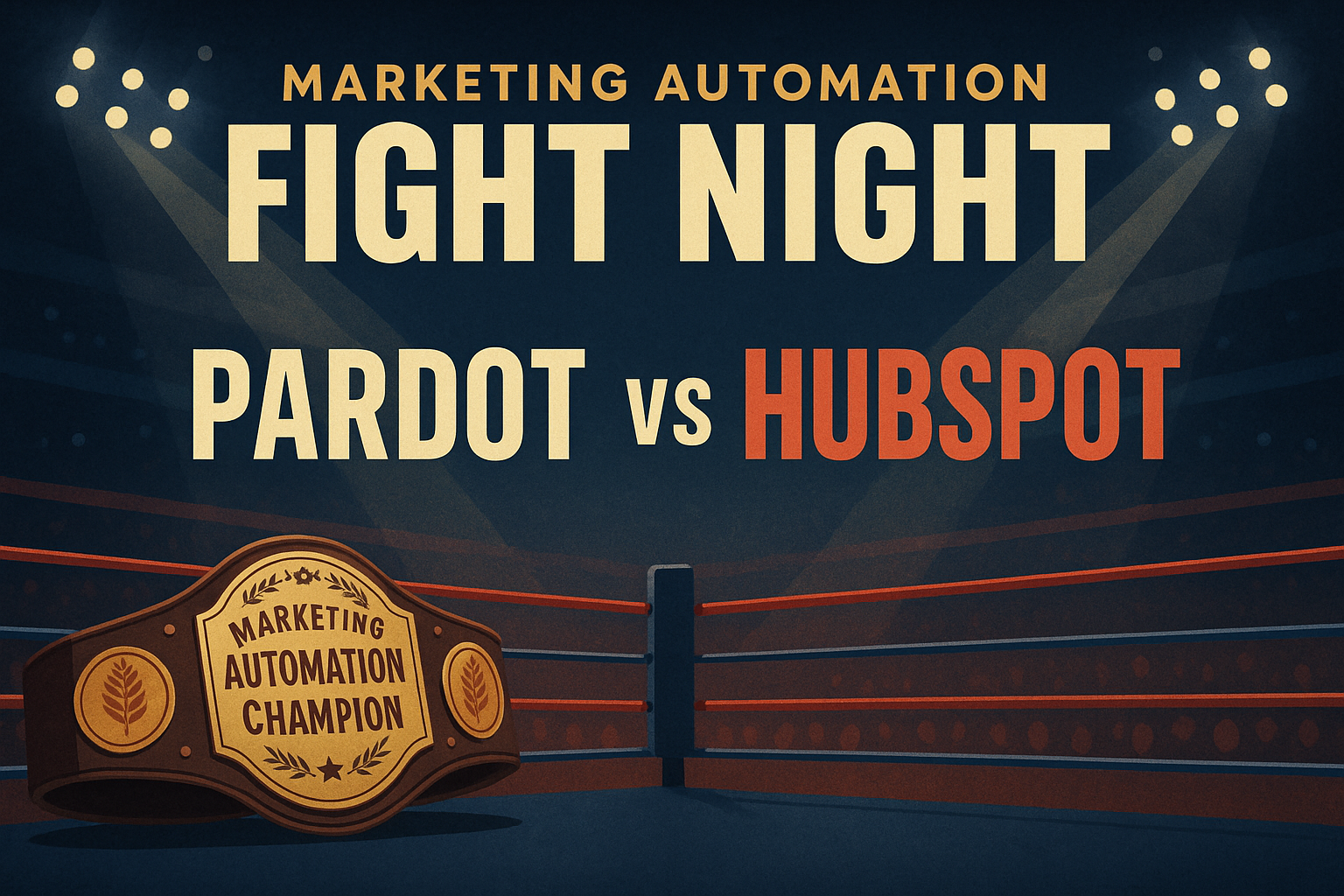 Let’s imagine you’re in a meeting—a long one, the kind with too many beverages and too few decisions—when someone inevitably leans forward and says:“Okay, but which platform should we actually choose… Salesforce Pardot or HubSpot?”
Let’s imagine you’re in a meeting—a long one, the kind with too many beverages and too few decisions—when someone inevitably leans forward and says:“Okay, but which platform should we actually choose… Salesforce Pardot or HubSpot?”
And suddenly, the room gets quiet. People look at you. Someone even swivels their chair dramatically, as if this is the moment you’ve been training for.
This blog is here so you really can be ready for that moment—complete with technical accuracy, clarity, and a little personality. Welcome to the showdown of Pardot vs. HubSpot.
Two Platforms: HubSpot vs. Salesforce Pardot
Before we compare their powers, let’s get acquainted.
Salesforce Pardot—yes, technically it’s called Salesforce Marketing Cloud Account Engagement, but everyone keeps saying Pardot anyway—is the platform that grew up in the Salesforce ecosystem. It’s built for B2B marketers who deal with long sales cycles, multiple decision-makers, and a very serious relationship with Salesforce CRM.
HubSpot Marketing Hub, in contrast, is the all-in-one platform that feels like it was designed by a marketer who had spent years yelling “Why isn’t this easier?” into the void. It’s frictionless, friendly, and makes onboarding feel like a warm hug.
Both are powerful. Both are loved. And both are absolutely not interchangeable.
7 Factors to Consider When Choosing Salesforce Pardot vs. HubSpot
Choosing between Salesforce Pardot and Hubspot isn’t just a software decision; it’s a whole strategic vibe check. Both platforms promise automation magic, smarter marketing, and better alignment with sales—but they go about it in very different ways.
Before you declare yourself Team Pardot or Team HubSpot, here are seven make-or-break factors that will shape which platform actually fits your business (and your sanity). Let’s dive in.
1. CRM Early Adoption
Let’s start with the question everyone secretly cares about: How painful is it to learn?
If your team wants something intuitive, visually clean, and forgiving when you make mistakes, HubSpot is the clear winner. You can almost hear it whisper, “Don’t worry, you got this,” every time you open the interface.
Salesforce Pardot, meanwhile, is more like a luxury car with a sophisticated cockpit: incredibly powerful, but you might hit a few buttons before you learn what they all do. Once you understand the structure—how Salesforce campaigns interact with Pardot assets, how automations are designed, how scoring and grading work—it becomes a precision instrument.
In short: HubSpot is easy first, powerful second. Pardot is powerful first, easy second.
2. CRM Integration
Here’s the twist that changes everything: Your CRM almost always decides this for you.
If your business runs on Salesforce CRM, Pardot wins by default. Its integration is native, elegant, and deeply connected to leads, contacts, opportunities, campaigns—you name it. Marketing and sales alignment isn’t something you configure; it simply happens.
If you’re using HubSpot CRM or don’t yet have a CRM, HubSpot is the obvious partner. It’s all in one place: CRM, email, landing pages, automations, analytics, and even your website if you want it.
Can HubSpot and Salesforce work together? Yes. Will it ever match Pardot’s native integration? No.
This is the moment in the story where people start nodding slowly and saying, “Okay, that makes sense.”
3. HubSpot vs. Salesforce Lead Management
Now let’s talk about how each platform handles prospects—the digital equivalent of romance.Pardot is the relationship expert. It understands nuance. If your sales cycle spans weeks or months and buyers need nurturing, education, and multiple touches, Pardot is in its element. Lead scoring and grading give sales teams clear signals about who’s ready and who needs more time in the oven.
HubSpot handles lead management beautifully, too, but it’s optimized for teams with shorter cycles and simpler qualification models. It’s fast, clean, and efficient—perfect when your buyer journey is more straightforward.
Pardot is a slow-burning love story. HubSpot is a whirlwind romance.
4. Automation, Email, and AI
This is where the platforms flex their mental muscles.
HubSpot’s automation builder is one of the most beloved features in the marketing universe. Everything is drag-and-drop. Workflows feel visual and intuitive. Behavioral triggers, lead nurturing, branching logic—it all flows like a well-plotted novel. HubSpot also layers in AI for content suggestions, optimizations, and workflow enhancements that make marketers feel… smarter.
Pardot approaches automation with more depth, especially when enriched by Salesforce data. Journeys can become very sophisticated: multi-branch logic, complex scoring, segmentation that pulls from CRM fields, and automations that sync perfectly with sales processes. Einstein AI enhances predictive scoring and intent insights—but in a way that requires thoughtful setup, not a single toggle switch.
HubSpot gives you fast, elegant automation out of the box. Pardot gives you unmatched power once everything is configured correctly.
5. Content, Landing Pages, and Social Tools
If your marketing universe revolves around content, HubSpot starts looking like a creative director’s dream. Its CMS, landing page builder, SEO tools, and social scheduling all live in one tidy ecosystem. You can plan a campaign, create content, publish it, and measure performance without opening 12 tabs.
Pardot absolutely supports landing pages and forms—its modern drag-and-drop builder is fully capable and works wonderfully for conversion assets. But Pardot doesn’t pretend to be your all-in-one content machine. For deeper content management, teams often rely on Salesforce CMS or external platforms.
So in this category, HubSpot is the content studio. Pardot is the conversion specialist.
6. Analytics and Reporting
HubSpot delivers wonderfully clear performance dashboards the moment you log in. Attribution, campaign performance, email engagement, lifecycle stages—it’s all laid out in a way that makes sense without consulting an admin.
Pardot’s analytics are more customizable and far more powerful when paired with Salesforce reports and dashboards. You can build an actual revenue operations engine that connects marketing influence to opportunities and deals with precision—but it takes more configuration and more Salesforce familiarity.
HubSpot gives you insights quickly. Pardot gives you insights deeply.
7. Pricing
Let’s be honest: Pricing absolutely influences this decision.
HubSpot starts low—delightfully low—which makes it attractive for startups, small teams, or companies dipping their toes into automation. But as your contact list grows, or your automation requirements ramp up, the cost can rise at a surprising pace.
Pardot starts at a premium price point, but one thing marketers appreciate is its predictability. You’re not going to get walloped by unexpected pricing jumps when your database expands.
HubSpot is affordable early. Pardot is stable long-term.
Should You Choose HubSpot or Salesforce Pardot?
Here’s where the stories converge.
If your team is content-driven, your sales cycle is relatively short, and you want a tool that’s easy to learn and delightful to use, you’ll probably be happiest in HubSpot’s universe. It’s built for speed, creativity, and the energy of inbound marketing.
If your team lives inside Salesforce, relies on sales-marketing alignment, or manages long B2B journeys with multiple stakeholders, Salesforce Pardot (Salesforce Marketing Cloud Account Engagement) is the stronger choice. It’s built for depth, precision, and revenue impact.
There is no “better” platform. There is only the platform that’s better for you.
A Final Word on CRM Implementation
No matter which platform you choose, here’s the truth seasoned marketers already know:
Marketing automation succeeds or fails based on setup.
The right partner will help you design scoring models, clean your data, connect your CRM, build journeys that actually convert, and keep your team from reinventing wheels.
Choosing between Pardot and HubSpot is the first step. Implementing it correctly is what actually moves the needle. Give us a shout, and we can help you out.








SHARE